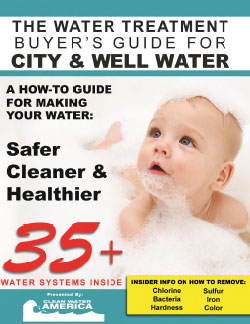News
What is the Maintenance on a POU Reverse Osmosis System?
The RO system requires that the Pre and Post Carbon Filters be changed once a year for full time residents and every other year for part time residents. However, part time residents will need a special post filter to prevent bacteria from growing in the system while they are absent. The RO system also has […]
....read moreWhere is a Point of Use (POU) Reverse Osmosis System installed?
RO Systems are usually installed under the kitchen sink with a third faucet at the sink top. It can be installed in remote locations such as the garage or other kitchen cabinets etc if need be. Most refrigerator ice makers gets its water from under the kitchen sink, so the purified water is routed to […]
....read moreWhat Does a Reverse Osmosis Purification System Remove?
A Reverse Osmosis Purification System removes all the contaminants that a Filtered System does: Filtered water contaminants list. Plus it additionally removes: Bacteria Virus Radium Ammonia Total Dissolved Solids Nitrates Floride Purification Explained
....read moreWhat is Purified Water?
Purified water is one tremendous step cleaner than filtered water. After the source water is filtered through activated carbon pre filters, it is forced at high pressure through a microscopic membrane which rejects the maximum amount of contaminants present in the water. The water is then passed through a post filter that can remineralize, carbon […]
....read moreWhat type of Carbon Filter Systems does Clean Water America Have?
We have many different types of systems to fit every need and budget. Call us today to have one of our representatives stop by your home to check out the installation site and test your water or drop by one of our Water Center Stores and bring a sample of your water for testing. We […]
....read moreHow do I Maintain a Whole House Carbon Filter?
A carbon filter loses its effectiveness as it becomes saturated with contaminants, consequently the carbon needs to be replaced on a regular basis. Before purchasing any unit, determine the approximate period of time the carbon should last, and how much it should cost to replace it. If a filter is used longer than its rated […]
....read moreWhere is a Whole House Carbon Filter Installed?
Clean Water America’s water systems are manufactured in Florida, for Florida weather conditions and can be safely installed outdoors. For a city water, a whole house carbon filter system should be installed outside the home, after the water meter, on the main water pipe coming into the house. For well water it should be installed […]
....read moreWhat Types of Carbon Mineral are Available for the Whole House Carbon Filters and What do they Remove?
There are basically four different types of carbon mineral that provide a specific service and/or filter out specific contaminants. The most common types of carbon mineral are: T&O Carbon which is coarser and can adsorb larger molecules like chlorine and their by products of THM’s, along with man made pollutants such as benzene, PCB’s etc. […]
....read moreAre There Different Types of Whole House Carbon Filters?
There are two different types; “Cartridge Filters” and “Tank Filters” The Cartridge Filter is a large filter housing, about 20”, which allows for a very large cartridge to be installed. These cartridges can handle high flow rates and are able to remove a broad range of chemicals. The cartridges should be replaced every 6 months […]
....read moreHow Do I Select the Proper Whole House Carbon Filtration System for my Home?
Begin by having your household water tested to determine which contaminants may be present. For concerns about health-related contaminants, contact your local Health Department to secure the names of state certified laboratories that can test your water. If you are concerned about aesthetic contaminants that affect the taste, smell or odor of your water, contact […]
....read more

